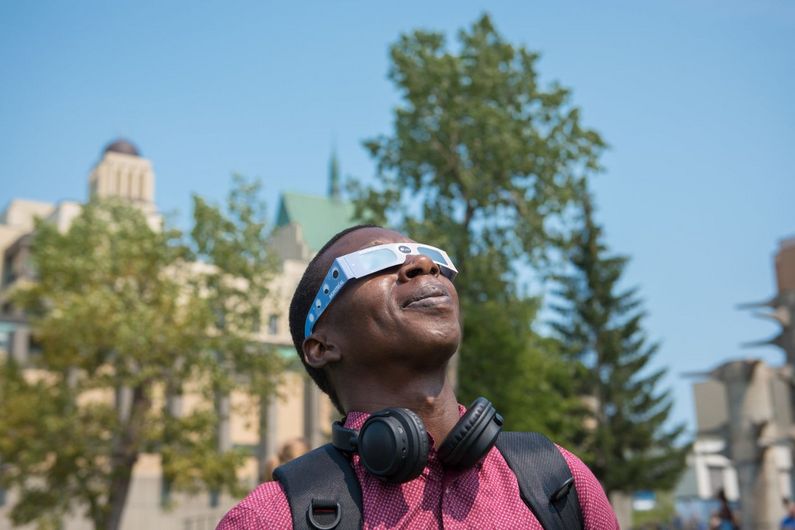Looking at the sun, safely
- UdeMNouvelles
03/11/2024
- Béatrice St-Cyr-Leroux
To get the best view of the total solar eclipse on April 8 – without ruining your eyes – you should heed the advice of optometrist and professor Jean-Marie Hanssens.
It’s around 3 p.m. on Monday, April 8. Like thousands of Quebecers, you're in a state of excited anticipation. You’re about to witness a rare and spectacular astronomical event, the first since 1972 and the last of this century in Quebec.
But are you fully prepared? Do you know how to observe a total solar eclipse without jeopardizing your eyesight? Are you aware that looking directly at the sun can cause serious damage to the retina?
Jean-Marie Hanssens, a professor in Université de Montréal’s School of Optometry and director of the university’s eye clinic, is here to answer your questions.
Why is it dangerous to look at the sun?
The sun can harm the eye in several ways. For example, if you're out skiing or lying on the beach, without adequate protection the front part of the eye can get damaged. It’s a little like being sunburned the next day, but in your eye instead of on your skin. This condition is called photokeratitis, or snow blindness.
If you gaze directly at the sun, the main risk is that it will burn the retina, which is at the back of the eye. This damage can be reversible, but it can also cause permanent loss of vision.
What happens during an eclipse?
In everyday life, we don’t worry too much about protecting ourselves from the sun because its brightness prevents us from looking directly at it; our reflex is to look away. The danger comes during the partial phase of an eclipse, when the sun is not completely obscured but its brightness is more tolerable because less light reaches the eye. At that point, it can be tempting to look directly at it, especially with all the media hype leading up to the big event.
What are the symptoms of retinal burn?
Interestingly, there is no pain. And the effect is not immediate. At first, there’s just a flash. It is not until a few minutes later, or even the next day, that the symptoms appear. These can include blurred vision, reduced visual acuity, floaters, altered colour perception, visual distortion and headaches.
Is there a risk during the total phase of the eclipse?
When the sun is completely hidden by the moon, you can look at the eclipse with the naked eye. However, it is difficult to know exactly when it is safe to remove your eclipse glasses. You need to take them off to see the total eclipse, which you don’t want to miss.
What exactly are eclipse glasses?
Eclipse glasses are the safest and most satisfying way to view a solar eclipse. Certified glasses that are designed specifically for watching an eclipse bear ISO 12312-2 certification. They are the equivalent of welding goggles but specifically for the sun. When you put them on, you can’t see anything except a powerful light source like the sun. You shouldn’t be able to see a lamp or light bulb through them.
If you can’t find eclipse glasses, how can you view the eclipse safely?
You can also observe the eclipse indirectly using a pinhole projector. Making an eclipse box with a pinhole through which the sun enters and is projected onto a white sheet of paper is a fun craft project that children will enjoy.
Never watch an eclipse through a window or mirror, or by wearing several sunglasses on top of each other.
It is perfectly safe to watch the eclipse via retransmission on any screen.
Can you film or take photos of the eclipse with a cell phone?
Contrary to popular belief, it is not dangerous to watch the eclipse on your phone screen—as long as you keep your eyes glued to the screen and your phone is between your eye and the sun. If you look above, below or around your phone—to focus, for example—you will expose yourself to the sun’s rays.











